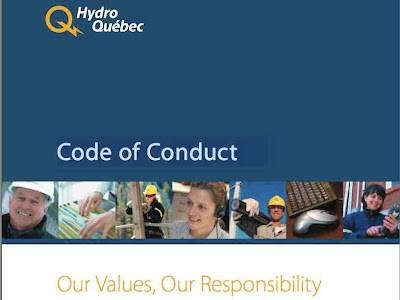
Quebec's minister in charge of Hydro-Quebec, Nathalie Normandeau finally commented on the the donation affair over at Hydro-Quebec.
Conveniently on vacation, she waited out public reaction to see where the chips would fall and then when the media and the public gave up on the story, she defended Mr. Vandal saying that it wasn't a conflict of interest because he didn't gain anything personally.
According to her and André Pratte, the editorialist in La Presse, unless the money ends up in your pocket it isn't a conflict.
By that logic you could send money to your sister, your mother, your uncle's company and you'd be in the clear!
It's utter nonsense. Had the donation gone through to the school, Mr. Vandal would have gotten a direct benefit, perhaps not monetary but a very direct benefit none the less. As he was the one who clearly brought in the donation, he would have received the credit and recognition. Doesn't that count? For rich and powerful people, recognition is as important as money.
Does Mr. Vandal really believe that he didn't fiddle the system to his advantage?
We don't know his side of the story because he continues to duck the press, a sure sign of a guilty conscience. I imagine that if he did face the press, this is what he'd say;
"I respectfully decline to answer the question based onPerhaps Mr. Vandal and all those defending him should read the Hydro-Quebec 'Code of Conduct.' It's got quite a bit to say on the subject of conflict and by the way, look who wrote the preface!;myfifth admendment rightsthe fact that my position is indefensible."
Page 2You can read all about Hydro-Quebec policies here.
...The company’s reputation is a precious asset, and customers have very high expectations in terms of honesty and transparency...
...This Code of Conduct is designed to help us determine the attitude we should adopt in the performance of our duties. As employees of Hydro-Québec, we must all familiarize ourselves with the Code and apply the ethical principles it is based on. Let us apply it to everything we do and to each decision we make, in keeping with our shared values.-Thierry VandalPage 3
President and Chief Executive Officer
...We must be honest and responsible. In a public utility, the conduct of each employee has to be irreproachable and beyond suspicion...
....Good faith alone will not necessarily protect us from an error whose consequences could be detrimental for us and for Hydro-Québec . The appearance of conflict of interest, for example, may create doubt or uncertainty on the part of the public and tarnish the company’s image...
...The Code of Conduct cannot cover all the situations that are likely to arise, and leaves it to each of us to demonstrate good judgment .
Page 5
...As Hydro-Québec employees, we must behave irreproachably in managing the property entrusted to us . The principles of ethics go beyond applying corporate guidelines, and call upon the company’s internal culture and a natural sense of justice. In the absence of rules or in situations not covered by company guidelines, Hydro-Québec expects us to adhere to the general rules of sound management . Transparency must characterize our every action.
...When are we in a conflict of interest?
A conflict of interest exists when we are placed in a situation where we risk favoring our own interests or those of a third party rather than Hydro-Québec’s. We must avoid placing ourselves in a situation where our personal interests or those of our spouse, a family member or a business partner could be in actual or apparent conflict with Hydro-Québec’s interests . Such conflicts could lead us to favor our own interests in certain situations, whereas those of Hydro-Québec should always prevail.
Page 7
We must not place ourselves in a situation of actual or apparent conflict of interest, regardless of the honesty of our intentions...
“Conflict of interest” does not refer only to financial transactions or economic benefits. It may take various other forms as well: influencing a decision related to the hiring process, for example, or giving preferential treatment to individuals or corporate entities. Accordingly, we must avoid having external interests, activities or influences that could compromise our independence in any decision we make or any other initiative within the company .
When is there an apparent conflict of interest?
There is an apparent conflict of interest when, even in the absence of an actual conflict, a situation creates the impression that a conflict of interest could exist .
For example, if a relatively well informed person might conclude that your performance of a task or duty has been or could be influenced by your own interests or those of your spouse, a family member, a friend or a business partner, you are in an apparent conflict of interest.
In relation to the code of ethics Mr. Vandal's actions can best be described in one word....FAIL!